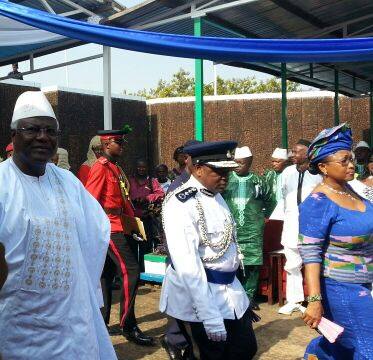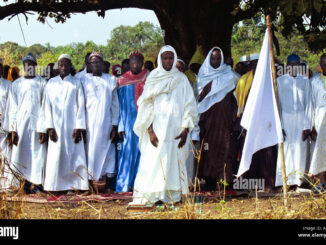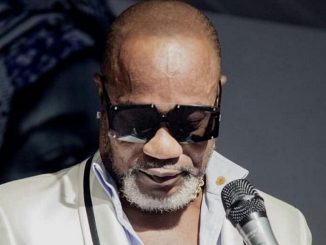
Introductory statement by His Excellency the
President, Dr Ernest Bai Koroma during the State
Opening of Parliament. Ceremony already underway.
MR. SPEAKER,
MR. VICE PRESIDENT,
MY LADY THE CHIEF JUSTICE,
MINISTERS OF GOVERNMENT,
HONOURABLE MEMBERS OF PARLIAMENT,
EXCELLENCIES,
MEMBERS OF THE DIPLOMATIC CORPS,
HIS WORSHIP THE MAYOR OF FREETOWN,
DISTINGUISHED GUESTS,
LADIES AND GENTLEMEN:
PRESIDENT KOROMA HEADING FOR PARLIAMENT
This time last year, we did not have an Ebola
outbreak; and no one in the whole world thought a
deadly virus like this would strike our sub region
and cause so much tragedy, disrupt so many plans,
and put at grave risk the very survival of our nation.
This time last year, Sierra Leone won high praise
and acclamation around the world as a country
transforming itself into a model of post war
recovery, a country registering sterling economic
growth, a country improving its scores on most
indices of governance, peace, investor confidence
and democracy. This time last year, thousands of
our compatriots from the diaspora were trooping to
this nation of their birth, most of them confident that
the country was opening up to its great potentials.
There were many challenges, but the country was
moving on with a zeal that never tires to assert the
better aspirations of our people.
There were many challenges in the health sector,
but the free health care initiative was getting more
people into hospitals, and infant and maternal
mortality rates were decreasing; there were many
challenges with our infrastructure, but roads were
being built everywhere; there were many challenges
with our energy sector, but electricity generation
and distribution were rapidly improving; there were
challenges with the education sector, but more
people were at school than at any other time, more
people were passing public exams, more girls were
in school and more resources had been given to
universities than at any time in our history. As with
all countries, we had our law and order challenges,
but the country was more at peace than at any time
in the last decades, and our soldiers and police
officers were models of peace keeping in Africa. And
then Ebola struck.
It came to us from a brotherly country that stood
firmly with us during our civil war. Ebola is a
disease that is new to West Africa, and it is new to
us. We sought advice from our international friends
believing that they knew more about the disease
than us. But Ebola in West Africa presented
challenges that no one foresaw. Because of
ignorance, fear and denial, our actions and that of
our international friends could not stem the spread
of the disease.
Many doctors and nurses fought valiantly; but the
virus created lots of panic amongst our people. It
was very difficult for so many to understand why
they must not care for sick relatives as they were
used to doing and why they could not bury their
dead. It was difficult to understand why relatives of
the Ebola-infected living in the same household
must be quarantined; why men and women in white
suits should come for the sick and take them away
to treatment centres.
Rumors of ill intent spread; people hid their sick;
others fled to relatives living in other places, taking
the virus with them. Since the start of the outbreak,
over 6000 Sierra Leoneans have been infected.
Thousands have died of the virus in the sub-region.
May I ask that we rise up for a minute of silent
prayer for doctors, nurses and all our compatriots
who have fallen victim of this dreaded virus. May
their souls rest in peace!
Ebola is hitting us very hard because we are a very
close-knit society. We are in very close proximity to
each other, we can reach each other’s towns and
villages in record time; our relatives are everywhere
seeking jobs, businesses and other opportunities.
That is why a tragedy anywhere in Sierra Leone is a
tragedy everywhere in this country. The increasing
number of good roads is increasing our daily
contacts with each other. Ebola is not a disease of
any one district, or region, or country. It is a
disease of the world. Globalization, increasing
urbanization, faster transportation and denser
networks of people moving between rural and urban
areas and across borders is fuel for more rapid
spread of formerly isolated viral diseases.
We note that many countries reacted to the Ebola
outbreak in our sub region with a flurry of fear and
panic that led to travel restrictions to and from
Sierra Leone and our region. But panic is a recipe
for bad policies; no country should treat people
from affected countries like viruses. We are humans,
we are Africans, we are Sierra Leoneans.
And because we are humans, because we are Sierra
Leoneans, because our will to live is as strong as
people everywhere on earth, we will defeat this
virus. The fight-back is on. Thousands, including
doctors, nurses, lab technicians, contact tracers and
other health workers are standing up to fight the
virus. They are our greatest patriots. Like loyal
soldiers during the war, they put themselves in
harm’s way to save our lives. It has been a very
difficult battle. But our doctors and nurses have
ensured that over 1100 of those infected have been
healed. Over 80% of the personnel on the ground
fighting the disease are Sierra Leoneans. Sierra
Leonean doctors and nurses provide most of the
frontline services at treatment and holding centres;
Sierra Leoneans are the contact tracers, and they
constitute the surveillance and burial teams. The
largest treatment centre in the country with 120
beds at Hastings, opened in September, is run by
young Sierra Leonean doctors and nurses and they
have since ensured the survival of over 350 persons
infected with the virus. We salute the doctors,
nurses, health workers and others all over Sierra
Leone presently working to contain this virus.
The fight-back is on, and international support is
increasing our capacity to defeat the virus. The
United Nations held a special session on Ebola and
established in record time the United Nations
Mission for Emergency Ebola Response (UNMEER).
The World Bank and IMF have approved resources
to fight the disease. The British are sending nearly a
thousand personnel here and are building several
treatment centres with laboratory capacity. The
Cubans have provided health workers. The Chinese
have provided medical equipment, a lab, and health
workers. The WHO and the American CDC are
providing invaluable support, and we have had
support from the EU, South Africa, Nigeria, ECOWAS,
Ireland, Japan, Holland, South Korea and many other
countries.
That countries and organizations have made
commitments amounting to hundreds of millions of
dollars is great, and it is worthy to note that the
number of those that have disbursed or delivered on
their commitments is increasing. But a lot of the
commitments made have not been disbursed; they
are not yet facts on the ground, and it is only when
they become facts on the ground that they could be
utilized in the fight against Ebola.
Mr. Speaker, Honourable Members of Parliament,
there are still numerous challenges, but the fight-
back is on. In October, we restructured our
response, and placed it under a single command
and control, the National Ebola Response Centre
(NERC) headed by the Minister of Defence on special
assignment as Chief Executive Officer. The Ebola
Virus Disease is war against us, and we must fight
it with tenacity, resolve and discipline. Our objective
now is to break the chain of transmission of the
disease and stop its spread. The way to do this is
to ensure safe burials; remove the infected from
communities into holding and treatment centres;
and hasten Ebola tests.
With support from our partners, including the British,
the Chinese, the Americans, MSF, Red Cross, IMC,
Emergency and others, we currently have seven
treatment centres. But the total bed capacity in all
these treatment centres is smaller than the
minimum 1500-bed capacity needed in the country
to stay ahead of the virus. Additional treatment
centres are being built in Bombali, Port Loko,
Moyamba, Tonkolili and Freetown, but even these
would not get us to the estimated number of beds
needed. Infection patterns are geographically
shifting. Hotspots at the initial outbreak of the
disease are registering very low infection rates,
while other areas have seen spikes.
Treatment centres need personnel, and the country
is in dire need of these personnel, for without them,
treatment centres are non-operational. We are
acting on getting more personnel to the country,
and more support in training for health workers.
Ending the outbreak would require more doctors,
nurses, infection control specialists, hygienists,
epidemiologists, nutritionists, and counselors. We
are heartened by pledges of African countries to
send in hundreds of health workers, and the African
Union’s coordination of this effort; we also welcome
the pledge of 30 million dollars by African
Businesses to facilitate the deployment of these
health workers to the sub region. But speed is of
the essence if we are to get quickly ahead of the
virus.
Mr. Speaker, the fight-back is on. We have
developed a post Ebola Recovery Plan. This may be
modified as we move along, but we will stop this
outbreak and recover from it unto greater strength,
wisdom, and action. The Ebola outbreak has created
great difficulties for the achievement of goals we set
out in our Agenda for Prosperity. But this country
will overcome these difficulties; we will defeat Ebola
and ensure recovery. Permit me now Mr. Speaker to
address the specifics of action, progress and
challenges across the various pillars of our Agenda
for Prosperity.




Leave a Reply